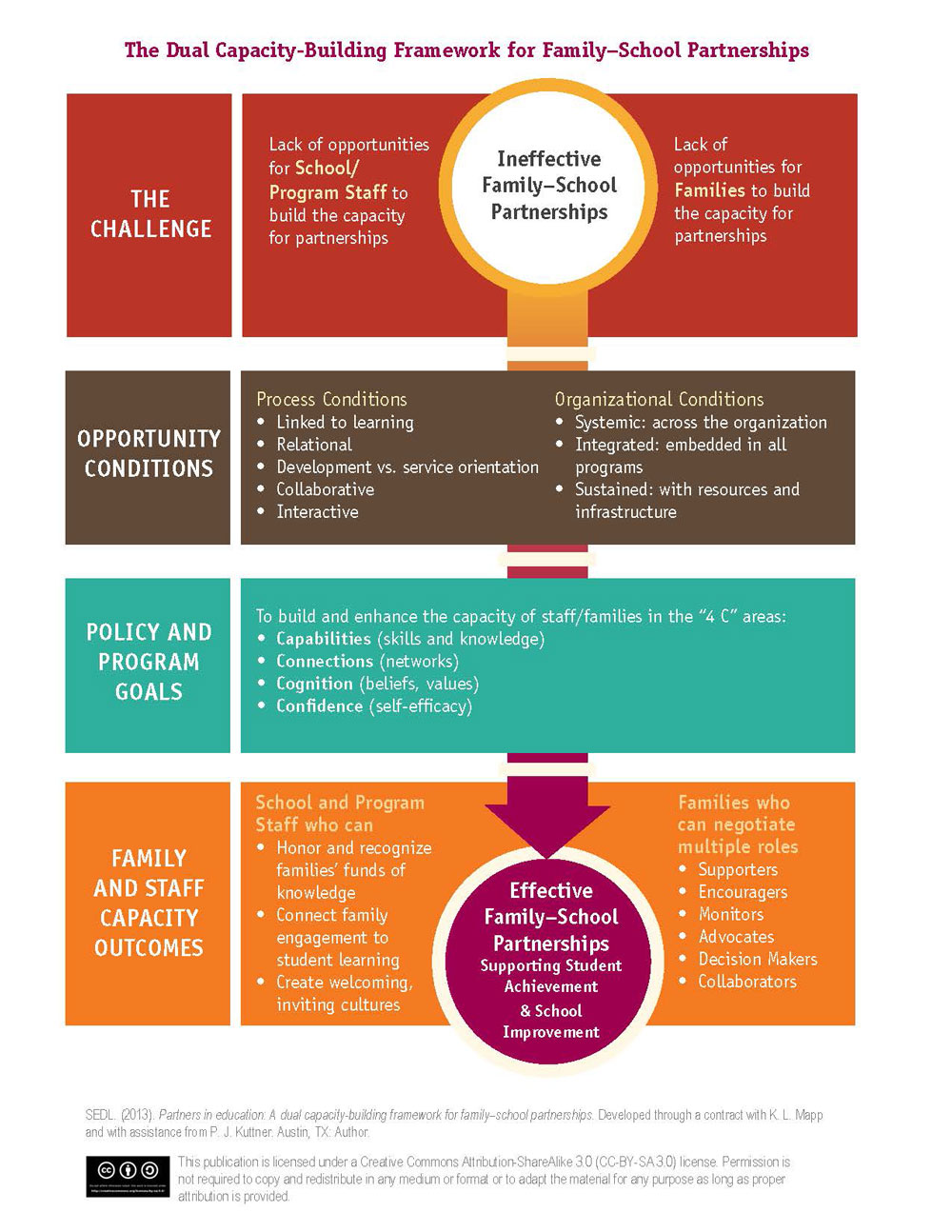
Family Engagement Matters
All parents want their children to do well in school. When parents participate, children achieve. They learn more, earn higher grades, and have better school attendance. All parents want to give their children the best foundation for their future.
As children are growing up, their most significant experiences and relationships will happen at home or at school. By partnering with their child’s school, parents can make sure that these environments are working together to prepare their child for future success.
 Family Engagement Newsletter Sign Up
Family Engagement Newsletter Sign Up
Parents and professionals: sign up to get the latest tips, tools, and resources for supporting family engagement with schools.
Published every other month.
Family Engagement or Parent Involvement — What’s the Difference?
A school striving for parent involvement often identifies projects and goals and then asks parents to contribute to making them happen. A school striving for family engagement solicits families’ input, concerns and thoughts, and then engages them in the process of addressing the identified needs. The goal of family engagement is to gain a variety of partners with a common vision.
It's not that parent involvement is bad. Almost all the research says that any kind of increased parent interest and support of students can help. But almost all the research shows that family engagement can be even more impactful — for students, for families, for schools, and for their communities (Ferlazzo & Hammond, 2009).
We use the term family engagement as it reflects our goal that families and schools become partners in helping their student succeed. It also reflects our core value that all families can and want to contribute to their child’s educational success.
Types of Family Engagement
Joyce Epstein of Johns Hopkins University developed a framework that defines six different types of parent involvement. This framework assists educators in developing school and family partnership program.
Parenting: Assist families with parenting and child-rearing skills, understanding child and adolescent development, and setting home conditions that support children as students at each age and grade level. Assist schools in understanding families.
Communicating: Communicate with families about school programs and student progress through effective school-to-home and home-to-school communications.
Volunteering: Improve recruitment, training and work, and schedules to involve families as volunteers and audiences at the school or in other locations to support student and school programs.
Learning at Home: Involve families with their children in learning activities at home, including homework and other curriculum-related activities and decisions.
Decision Making: Include families as participants in school decisions, governance, and advocacy through PTA/PTO, school councils, committees, action teams and other parent organizations.
Collaborating with the Community: Coordinate community resources and services for students, families and the school with businesses, agencies and other groups, and provide services to the community.
Family engagement work plans, policies or practices should include activities for each type of engagement.
In 2013, Karen Mapp developed a new framework on family engagement that emphasizes the need for family and schools to be partners in the process of supporting student achievement. It also defines the challenges that schools and families face and describes a way to implement effective interventions and the organizational structures that must be in place to do so. See the diagram below for details.
Sections
As a parent, you want your child to reach their potential. You want them to have a future where they can use their unique gifts and capabilities. Your vision and high expectations for your child’s future are powerful – and research shows that high expectations do have an impact on your child’s school success. This type of family engagement helps your child to believe in the power of education.
As a parent, you are your child’s first and most important teacher. When your child enters school, you and the school become partners in what you both envision will be the successful development and education of your child.
All families play an important role in supporting their student’s success in school. One way to support your student, at any age, is to monitor their academic progress.
Important information from your student's school is often sent to you by email. Encourage your student to check their email regularly and also do so yourself! It's great practice for college and future careers.
Use clear and concise communication when emailing teachers, counselors, or college representatives. For example, use a subject line and greeting, recount details using dates and names and how you would like the issue to be resolved, and include your contact information.
There are many ways that families can support their students outside of school. Traditionally, parent involvement at home consisted of helping children do their homework or reading. While these supports are important, we know that there are many ways that families support their child’s education at home.
There is a saying that “it takes two to tango.” Family engagement is as much the responsibility of schools as it is of families. Both are needed to build an effective partnership that leads to student success.
Our Educator Toolkit for Family Engagement is designed for anyone who engages in educating children or promoting family engagement. Whether you work in a school building, a district office, a community organization, or serve on a committee that supports the education of children, there are resources in this toolkit to support and inspire you.
In Minnesota, school choice is part of state law. When considering a new or different school for your child, parents can choose from a variety of options.
All parents want their children to do well in school. One way to help children succeed is to be involved in their education. You can do many things to help your child do well in school. Try these tips!
School conferences are a great way for families to stay engaged in their child’s education. Attending conferences and talking with your child’s teacher helps to keep you aware of what is happening in the school and classroom. It is also a great time to discuss your child’s strengths, learning style, challenges, and build a relationship with your child’s teacher or teachers.
A key aspect of family engagement is including parent and caregivers in the decision-making process at their child's school. Here are resources for staff and families that inform, promote and support parent leadership.


 Family Engagement Newsletter Sign Up
Family Engagement Newsletter Sign Up